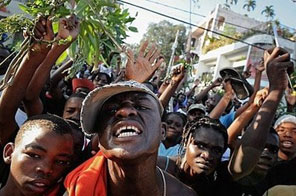Haiti death toll tops 200,000 as aid anger mounts
PORT-AU-PRINCE: The death toll in the Haiti quake has swelled to 200,000, Prime Minister Jean-Max Bellerive said Wednesday as angry protests over the slow arrival of aid flared on the rubble-strewn streets.
More than three weeks after the 7.0-magnitude earthquake, Bellerive said his tiny Caribbean nation had been ravaged by "a disaster on a planetary scale" and detailed the tragic toll suffered by his people.
"There are more than 200,000 people who have been clearly identified as people who are dead," he said in an interview with AFP, adding that another 300,000 injured had been treated, 250,000 homes had been destroyed and 30,000 businesses lost.
At least 4,000 amputations have also been carried out due to horrific crush injuries -- a shocking figure which is likely to strain the impoverished nation's already meager resources for years to come.
Bellerive said he has proposed the formation of an "emergency government" in Haiti to focus on the crisis, but insisted that the authorities, devastated as their ranks have been by the disaster, remained "in control of the situation."
Despite a massive aid operation, a lack of coordination and the sheer extent of the damage have hampered the distribution of food and water leading to mounting tensions among a million people left homeless.
"The Haitian government has done nothing for us, it has not given us any work. It has not given us the food we need," Sandrac Baptiste said bitterly as she left her makeshift tent to join angry demonstrations Wednesday.
In separate protests after a tense night when shots were fired in the ruined capital Port-au-Prince, some 300 people gathered outside the mayor's office in the once upscale Petionville neighborhood.
"If the police fire on us, we are going to set things ablaze," one of the protesters shouted, raising a cement block above his head.
Another 200 protesters marched toward the US embassy, crying out for food and aid, and about 50 protestors also gathered late Tuesday outside the police headquarters where the Haitian government of President Rene Preval is temporarily installed.
"Down with Preval," demonstrators shouted at the president who has only spoken to the people a few times since the disaster struck.
"There are no tents! There is no food!" protested Bousiquot Widmack, while demonstrators who said they were government workers complained their homes had collapsed, they had not been paid, and that they had nothing to eat.
Meanwhile, a group of US Christians were to learn Thursday whether they would be charged with trying to illegally take children out of the quake-stricken nation, a judge told AFP.
The 10 Americans from the Idaho-based Baptist group New Life Children's Refuge have been detained in Haiti since the weekend after they tried to take some 33 children out of the country to neighboring Dominican Republic.
The case has drawn the attention of Secretary of State Hillary Clinton, who said Wednesday it was "unfortunate that, whatever the motivation, that this group of Americans took matters into their own hands" in trying to take the children across the border.
"We are engaged in discussions with the Haitian government... and looking for the best way forward on this," she added.
Amid the mounting frustration in Haiti's streets, UN chief Ban Ki-moon asked former US president Bill Clinton to assume a leadership role in coordinating the international aid.
"The trick is to get the Haitian people back where they can stop living from day-to-day and start living from week-to-week or month-to-month and then start the long-term efforts," Bill Clinton said.
Related article: Mistrust in the eyes of rescued Haitian children
An aid group warned Wednesday against "quick-fix rebuilding" plans before sufficient studies had been done on how to best protect Haiti from future hurricanes and earthquakes.
"Right now the Haitian people need good quality temporary accommodation and emergency relief. But we are also looking at how we can help people to rebuild their lives over the next three years, leaving Haiti better prepared for future natural disasters," said Brendan Gormley, chief executive of the Disasters Emergency Committee, a British aid umbrella group.
For most of Haiti's one million homeless, the focus was on how to improve on the dire day-to-day conditions.
Marjorie Michel, the Haitian minister in charge of women's affairs, said neighborhood committees were reporting a rise in the number of rapes in the tent camps, although women were reluctant to make a formal complaint.
She said teams were being sent into the camps to try to deal with the situation, and promised segregated bathroom facilities would be installed in new camps.






